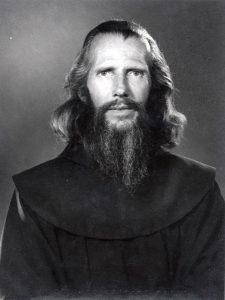
Born to an Anglican vicar and his wife in Cumberland (now Cumbria) County, England, Bradburne was baptized into the Church of England. During World War II he served with the Indian Army in India, Malaya, and Burma. During the war, faith became the dominant impulse in his life. He also met the future Father John Dove, SJ, who would play a decisive role in Bradburne’s life
After the war John returned to England, staying with the Benedictines at Buckfast Abbey. There, he converted to Catholicism and was received into the Church in 1947.
Bradburne had no interest whatsoever in politics, social issues, or current events. He wandered through England, France, Italy and the Middle East, often on foot, carrying his belongings in a small bag with almost no money.
He tried, and failed, to join the Benedictines in England, the Carthusians in England, the Order of Our Lady of Mount Sion, and an abbey in Belgium.
Bradburne had few practical skills. He played plainchant on the harmonium and recorder, loved birds, decorated his living quarters with feathers and pebbles he found on his walks, and ate but once a day. With more than 170,000 lines of verse, he holds a Guinness World Record as the most prolific poet in English.
In 1953, Bradburne took a private vow to Our Lady never to wed and consecrated himself to a life of celibacy. On Good Friday 1956, he joined the Secular Franciscans.
In 1962, he wrote Dove, asking “Is there a cave in Africa where I can pray?” Then he worked in several mission centre in Rhodesia for seven years before arriving in 1969 at the Mutemwa Leper Colony in Rhodesia, 90 miles northeast of the capital of Harare.
The conditions were abysmal, but Bradburne enlisted medical help from a nearby Catholic mission and tenderly cared for the abandoned residents: washing, bandaging, and bathing, as well as burying the dead. He fell out with the Rhodesian Leprosy Association over their plans to reduce rations and badge them, in spite of his devoted service, he was kicked out. For the last six years of his life, he lived in a tin hut just outside the enclosure’s perimeter, sweltering in the heat and continuing to minister to his beloved “family.”
Dove notes that Bradburne was a profoundly affectionate person “who was seldom fully understood and always gave more than he received, often to his cost in heart and spirit, and even in material goods. He would give his all to those he loved, as indeed he did at the end, with his life.”
The Rhodesian Bush War (also known as the Zimbabwe War of Independence) lasted from July 1964 to December 1979, and pitted the white minority ruling government against two African nationalist parties. As the war neared its conclusion and approached the leper colony, several lay and Catholic aid workers and missionaries were killed by guerillas. Bradburne’s friends urged him to leave, but he refused.
He was abducted on Sept. 3, 1979, and while kneeling in prayer two days later he was shot in the back.
On 1 July 2019 the Congregation for the Causes of Saints in Rome issued a formal nihil obstat for the cause of John Bradburne’s beatification to be started. The cause was officially launched on 5th September 2019 at Mutemwa by the Archbishop of Harare, Archbishop Ndlovo.
Feast day – September 5
Source: https://angelusnews.com/voices/john-bradburne/
